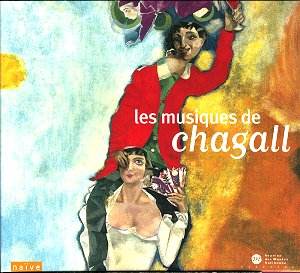This
quirky 2CD set comes from Naïve, a French company that I
confess I had not come across before. The idea behind the issue
is to explore the musical background and enthusiasms of the painter
Marc Chagall. He was born in Vitebsk, Russia, and was trained
in St.Petersburg, and, after many years of travelling, settled
in France in 1949, already aged 61. He lived on until 1985, and
his work is a unique fusion of Russian and French culture. Much
of his imagery is drawn from his Russian background, though distinctively
French elements, such as the Eiffel Tower, play their part too.
Chagall
loved music, and, as well as gaining inspiration from it, he was
often involved in musical enterprises, as reflected in the collection
here. He designed extensively for the theatre, and The Magic
Flute, Daphnis and Chloë and the Tchaikovsky Piano Trio
(used for Massine’s ballet Aleko), excerpts from all of
which appear on CD2, represent this involvement. Chagall knew
Olivier Messiaen personally, and was instrumental in organising
an early performance of Visions de l’amen..
Working
backwards, we find music by Ernest Bloch and, on CD1, klezmer
pieces reflecting Chagall’s Jewish roots, as well as movements
from Shostakovich’s Jazz Suite no.2 to represent his connections
with the circus, another aspect of Russian culture which features
prominently in his painting. All of this suffices to show that
this collection, which looks something of a hotch-potch at first
sight, is in fact a cunningly devised survey of Chagall’s musical
make-up. CD1 concentrates on his early Russian-Jewish origins,
whereas CD2 looks at the inspirations of the mature artist.
Is
this then an opportunist rag-bag of rejected performances? Emphatically
not; there are some really memorable tracks here, and the links
with Chagall are genuine, not contrived. Moshe Leiser’s earthy
baritone in the Yiddish songs of tracks 1-3 may not be everyone’s
cup of tea, but, if you like your tea with a slice of lemon as
I do in these hot days, you’ll appreciate his authenticity in
a famous number such as Dona dona. Klezmer music is becoming
ever more popular, and there are two entertaining examples here,
followed by some heartfelt, if rather lachrymose, singing from
the Moscow Male Voice Choir.
The
first examples of composed music (as opposed to folk music) are
two lovely Tchaikovsky songs, If Only I had Known and Berceuse.
Now here’s one for your next general knowledge quiz down the
local. Can you name a singer whose surname contains eight
letters and just one vowel? Well here she is; introducing
Ina Mkrtchyan! Crazy name, crazy girl as Glenda Slagg might comment
from the ‘Little England’ perspective. In fact she has a wonderful
voice, a true rich Russian alto, which she uses with great flexibility
and deep feeling. I was sorry not to have a text to follow – Naïve’s
packaging is, shall we say, minimalist in terms of information
about the music – and I will certainly be looking out keenly for
more opportunities to hear this remarkable singer and her equally
fine accompanist, Evgeny Talisman. For those interested, these
songs are taken from an opus 111 CD, OP 30219. CD1 is completed
with movements from Shostakovich’s Jazz Suite no.2 (nothing
like as good as the first one) and a rousing Kalinka from
the Mixed Choir of Sofia.
CD2
is made up of composers, some mentioned above, whose music had
special significance for Chagall. Bloch’s two works get impassioned
performances from Peter Bruns, and Sandrine Piau gives as near
perfect an account of that most touching Mozart aria, Ach,
ich fühl’s, as I’ve yet to hear, her high, pure
voice rising to the taxing tessitura with no difficulty – very
beautiful indeed.
The
Rare Fruits Council (another great name!) give a stylish reading
of the vivace from one of the Bach gamba sonatas, and Alison
Browner is equally convincing in Erbarme dich from the
St. Matthew Passion, with a controlled and expressive solo from
the (sadly uncredited) leader of Das Neue Orchester.
The
Ravel excerpts that follow are, firstly, an unsatisfactory ‘bleeding
chunk’ from the first Daphnis and Chloë suite, then
two of the wonderful Hebraic Melodies, the powerful Kaddish
and the haunting Eternal Enigma, both performed with
deep feeling by the baritone Bernard Kruysen, with Noël Lee
at the piano.
Tchaikovsky’s
Piano Trio, op.50, which many rate as his finest chamber work,
was written in 1881 in memory of Nikolay Rubinstein, a Russian
who had died in Paris earlier that year; so again, the connection
with Chagall is well founded, quite apart from the painter’s work
on the sets for Aleko mentioned above. The Trio
(Pezzo Elegiaco) is given a truly memorable performance
by Vovka Ashkenazy (son of Vladimir), Richard Stamper and Christine
Jackson. Their playing has unbridled passion where required, yet
they also find room for some intensely expressive pianissimi,
notably at the recapitulation of the main theme. This is compelling
music-making, and all this group really need is a name! (Their
performance, coupled with the Arensky Trio, is to be found on
Naxos 8.550467.)
After
the brief extract from Visons de l’amen, the disc concludes
with a classic recording; that of Casals playing the first of
the Bach ’cello suites. I must admit that, after all these bits
and pieces, it was quite a treat finally to be given a substantial
work in full, let alone one of this calibre and in such a performance.
Yes,
bits and pieces they may be, but these CDs do make immensely enjoyable
listening, and a tremendous amount of care and thought has gone
into the compilation. And in the process I not only learned more
about Chagall, one of my favourite painters, but also encountered
some superbly talented artists for the first time. Thank-you,
Naïve, I look forward to more enterprising issues of this
kind.
Gwyn
Parry-Jones



